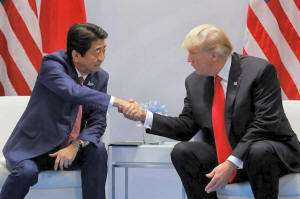|
As reality of Trump risk sinks in, Tokyo
tries to keep ties tight
 Send a link to a friend
Send a link to a friend
 [August 31, 2017]
By Linda Sieg [August 31, 2017]
By Linda Sieg
TOKYO (Reuters) - Six months after Japan's
premier bonded with Donald Trump on a golf course amid hopes he'd be a
pragmatic partner, a consensus is emerging that Tokyo must reduce risks
from the unpredictable president by forging ties with his more
mainstream advisers.
The increasing controversies surrounding Trump coincide with rising
tension over North Korea's rapidly developing missile and nuclear
programs. It raised the tension again on Tuesday by firing a ballistic
missile over northern Japan.
Whether by design or default, Trump and his aides have sent mixed
messages on North Korea, with Defense Secretary Jim Mattis saying on
Wednesday Washington still had diplomatic options shortly after Trump
tweeted that "talking was not the answer".
Mattis is high on the list of people in whom Japan puts its faith, along
with national security adviser H.R. McMaster, Vice President Mike Pence
and "globalists" such as top economic adviser Gary Cohn, Japanese
political officials say.

"Of course, we are aware the Trump administration faces internal
confusion domestically but we cannot let this shake the alliance in the
current situation of tension," a senior official of the ruling Liberal
Democratic Party told Reuters.
"It is necessary to minimize the impact and to do that, we need close
ties at every level ... By promoting multi-layered ties, we can minimize
the destabilizing factors."
In the latest such effort, Deputy Prime Minister Taro Aso heads to
Washington on Monday for economic talks with Pence.
The hope is that by staying engaged on the economic front, Japan can
prevent trade friction from Trump's "America First" policies from
eroding a vital security alliance.
"The risk with Trump is that he will link economic issues with
security," said another Japanese source. "The victim at the moment is
China, but there is no guarantee that Japan will not be among the
victims."
To be sure, Abe has kept close contact with Trump since his surprise
November election, meeting the president four times and speaking to him
11 times by telephone, including twice since Tuesday's missile launch.
The well-publicized calls are an important way to send a message to
North Korea that the U.S.-Japan alliance is tight, two former diplomats
said.

[to top of second column] |

Japanese Prime Minister Shinzo Abe shakes hands with U.S. President
Donald Trump during the bilateral meeting at the G20 leaders summit
in Hamburg, Germany July 8, 2017. REUTERS/Carlos Barria

'STRANGE ... UNSTABLE'
But while Abe has not been at odds with Trump publicly, early hopes that
the billionaire developer's campaign rhetoric on trade and defense was
mostly for show have faded.
"At first I thought 'He's a businessman and he knows what he's doing'...
But he's changed over the past half year. He seems to have become
confident in a strange way," said another senior LDP official.
"The Trump administration is very unstable and we're quite concerned."
Trump's remarks blaming "both sides" for violence between
counter-protesters and white supremacists at an August rally in
Charlottesville, Virginia, have also raised some concerns.
"To say discriminatory things that divide the American public touches on
the core of the American people," the second LDP official said. "To
split the American public is not a wise strategy ... It is very serious
and it is a worry."
With Japan ultimately reliant on the U.S. nuclear umbrella for its
defense, the growing reach of North Korea's missiles has prompted
concern about "decoupling" - the fear that Washington will be unable or
unwilling to defend Japan if its mainland comes under attack from North
Korean nuclear-tipped missiles.
To assuage such worries, a joint statement issued after an Aug. 17
meeting of the allies' foreign and defense ministers reconfirmed U.S.
commitment to protect Japan "through the full range of capabilities,
including U.S nuclear forces".

Japan has also sought assurances that Trump will not launch a strike
against North Korea without consulting Tokyo.
"I think if the U.S. were to take action, it would consult Japan
beforehand," the second LDP official said. "But I don't know."
(Additional reporting by Tetsushi Kajimoto; Editing by Robert Birsel)
[© 2017 Thomson Reuters. All rights
reserved.]
Copyright 2017 Reuters. All rights reserved. This material may not be published,
broadcast, rewritten or redistributed. |